As two of the top password managers today, both Bitwarden and 1Password offer quality password management — albeit in different ways. Bitwarden is an open-source solution with a strong emphasis on affordability and transparency. Meanwhile, 1Password is a closed-source service that offers a streamlined user experience with top-tier security.
In this article, we take a look at which password manager is best for you and your organization.
- Bitwarden: Best for users who need a high-quality password manager that’s both free and open-source.
- 1Password: Best for users who prioritize having an intuitive and well-designed user interface with many extra security features included.
Bitwarden vs 1Password: Comparison
| Our rating | ||
| Starting price (monthly) | ||
| Encryption | ||
| Authentication options | ||
| Customer support | ||
| Platform support | ||
| Free version | ||
| Free trial | ||
|
|
Bitwarden vs 1Password: Pricing
Both Bitwarden and 1Password divide their paid subscriptions into Personal and Business tiers. In terms of free plans, only Bitwarden has a free version, while 1Password doesn’t currently offer a dedicated free plan.
Fortunately, both password managers have free trials for their paid subscriptions. Of the two, 1Password is more generous as it provides a 14-day free trial for all its plans, except for its Enterprise subscription. In contrast, Bitwarden has a respectable seven-day free trial for both its Bitwarden Teams and Enterprise subscriptions.
Bitwarden pricing
Bitwarden Personal:
- Free: Unlimited passwords, unlimited devices.
- Premium: $0.83 per month; unlimited devices; integrated authenticator, file attachments, emergency access, among others.
- Families: $3.33 per month; up to 6 users; unlimited sharing, unlimited collections, organization storage.
Bitwarden Business:
- Teams: $4 per month per user; data sharing, event, and audit log monitoring, user groups, directory integration, among others.
- Enterprise: $6 per month per user; all Teams features plus enterprise policies, passwordless SSO integration, and account recovery capabilities.
- Custom quote: Contact sales for pricing; scalable subscription.
If you want to learn more, read our full Bitwarden review.
1Password pricing
Compared to Bitwarden’s monthly subscriptions, 1Password provides an option for either a monthly or an annual plan. Below is an overview of the pricing of 1Password’s plans for both contract options:
| 1Password Personal | |||
|---|---|---|---|
| Plan | Monthly | Annual | |
| Individual | $3.99 per month | $2.99 per month, paid annually | Covers 1 user, autofill capabilities, password sharing, end-to-end encryption |
| Families | $6.95 per month | $4.99 per month, paid annually | Covers 5 family members, all Individual features, plus simple admin controls and unlimited shared vaults |
| 1Password Business | |||
|---|---|---|---|
| Plan | Monthly | Annual | |
| Teams Starter Pack | $19.95 per month | $19.95 per month, paid annually | Covers up to 10 users; actionable security alerts, domain breach report, 1Password Developer |
| Business | $9.99 per user per month | $7.99 per user per month, paid annually | Covers unlimited seats; includes all Teams Starter Pack features plus integration with Okta, Entra ID, and others; advanced reporting, granular admin controls |
| Enterprise | Contact sales for a quote | Contact sales for a quote | All Business features plus a dedicated account manager, tailored onboarding, quarterly and annual business reviews, and priority for new business features |
If you want to learn more, read our full 1Password review.
Bitwarden vs 1Password: Feature comparison
Security and encryption
Winner: Tie
Both Bitwarden and 1Password offer high-end security with their respective password managers. In terms of encryption, both services utilize the AES-256 encryption algorithm, which is widely considered the industry standard in the space.
In addition, I’m happy to report that both Bitwarden and 1Password take third-party testing seriously. In the realm of security software, safety and security claims can only do so much. That’s why independent security audits are a critical feature to look out for.
For Bitwarden, they’ve shown a strong commitment to third-party testing with its suite of security audits dating back to 2018. It’s also SOC 2, GDPR, and HIPAA-compliant. Its most recent third-party audit was an assessment of its Web App conducted by security firm Cure53 back in August 2023.
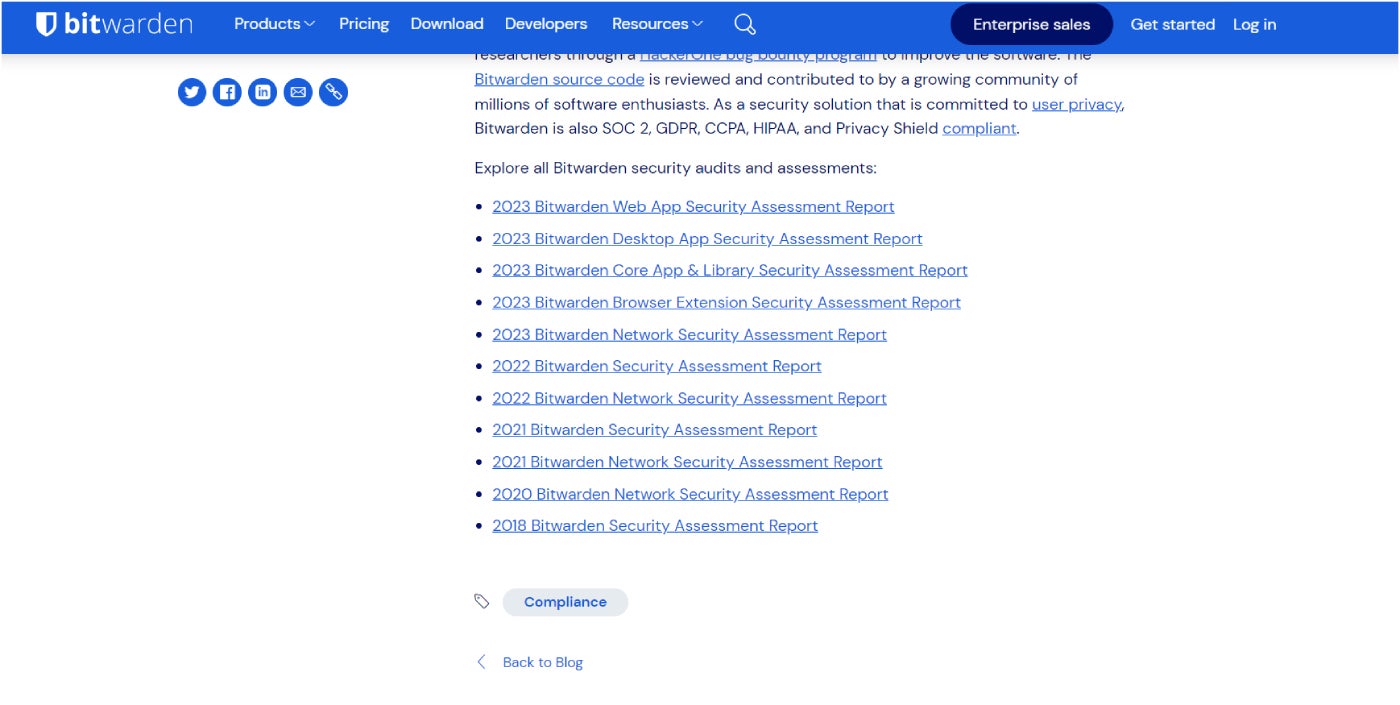
On the other hand, 1Password likewise offers an impressive portfolio of third-party audit results. As of May 2024, 1Password has 24 third-party audits covering various aspects of its password management service.
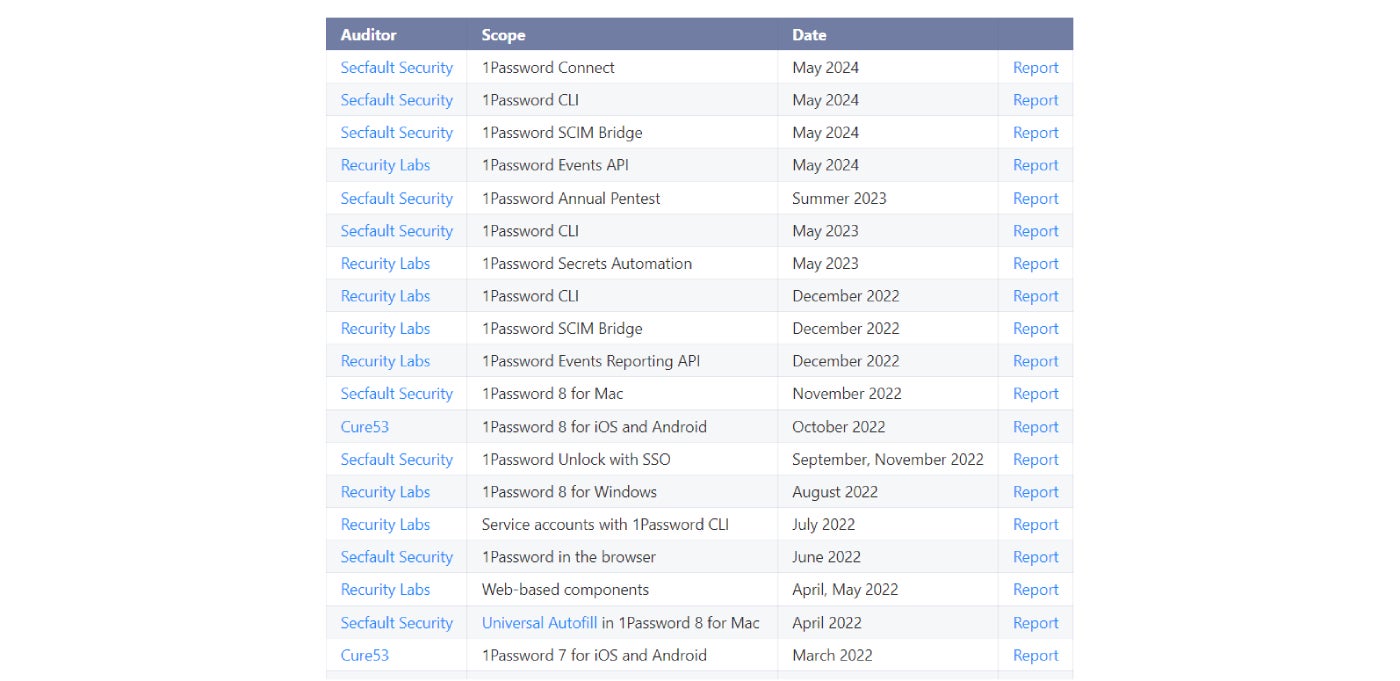
1Password has also achieved SOC 2 type 2, ISO 27001:2022, 27017:2015, 27018:2019, and 27701:2019 certifications — showing it meets industry and international standards for information security.
On August 6, 2024, 1Password shared that a vulnerability on 1Password 8 for Mac (versions before 8.10.36) was discovered, possibly affecting the application’s platform security. Per 1Password, the issue “enables a malicious process running locally on a machine to bypass inter-process communication protections.”
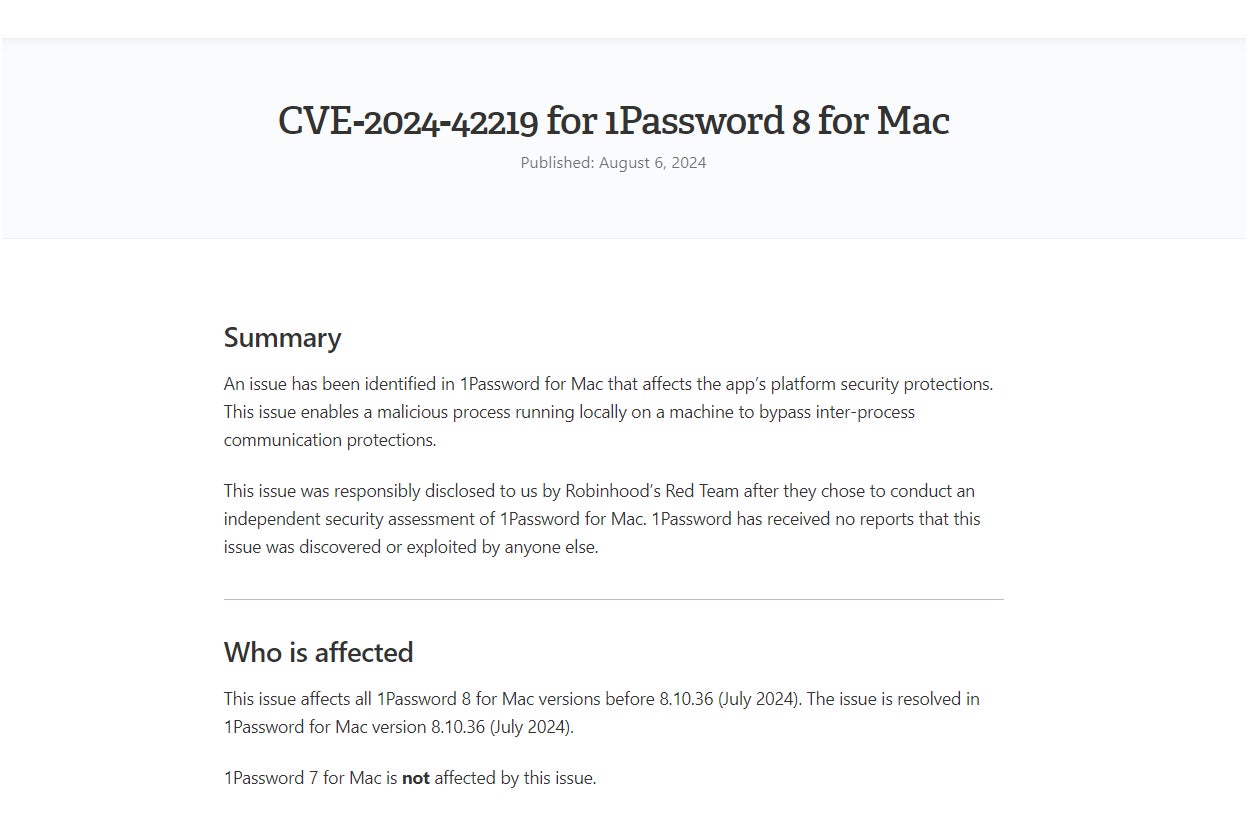
Fortunately, 1Password has patched the issue with 1Password for Mac version 8.10.36 and has said that there have been no reports of the issue being exploited by anyone else. In this instance, I commend 1Password for its straightforward, swift, and transparent response to the issue.
Finally, the two password managers differ in software distribution. Bitwarden is open-source, allowing the public to freely view its source code for possible holes or vulnerabilities. On the flipside, 1Password is closed-source with its full source code private.
Personally, I favor open-source software since it provides an additional layer of transparency. However, I acknowledge that closed-source software has its advantages — typically offering things like more premium customer support.
All in all, I have no trouble recommending either Bitwarden or 1Password in terms of security. Both password managers have the necessary security measures to ensure your passwords will be safe and secure.
Multi-factor authentication options
Winner: Bitwarden
When it comes to multi-factor authentication or two-factor authentication, I give the win to Bitwarden. Bitwarden offers a range of 2FA options. For its free version, it supports 2FA via FIDO2 WebAuthn credentials, authenticator apps, and email.
If you opt for their paid version, you get 2FA through Duo Security with Duo Push, SMS, phone call, security keys, and YubiKey support. I appreciate how Bitwarden still offers MFA/2FA to its free users, making it a realistic free option that doesn’t sacrifice essential security features like MFA.
That isn’t to say that 1Password is lagging behind. 1Password supports 2FA through authenticator apps and security keys like YubiKey and Titan. Specifically, 1Password supports authenticator apps like Authy, Microsoft Authenticator, or Okta Verify.
That being said, if you’re specifically looking for a wider variety of MFA options, I recommend going for Bitwarden over 1Password.
Ease of use and performance
Winner: 1Password
When it comes to ease of use and performance, I have to give it to 1Password. 1Password’s desktop application has a modern and intuitive user interface that I found pleasant to use throughout my testing.
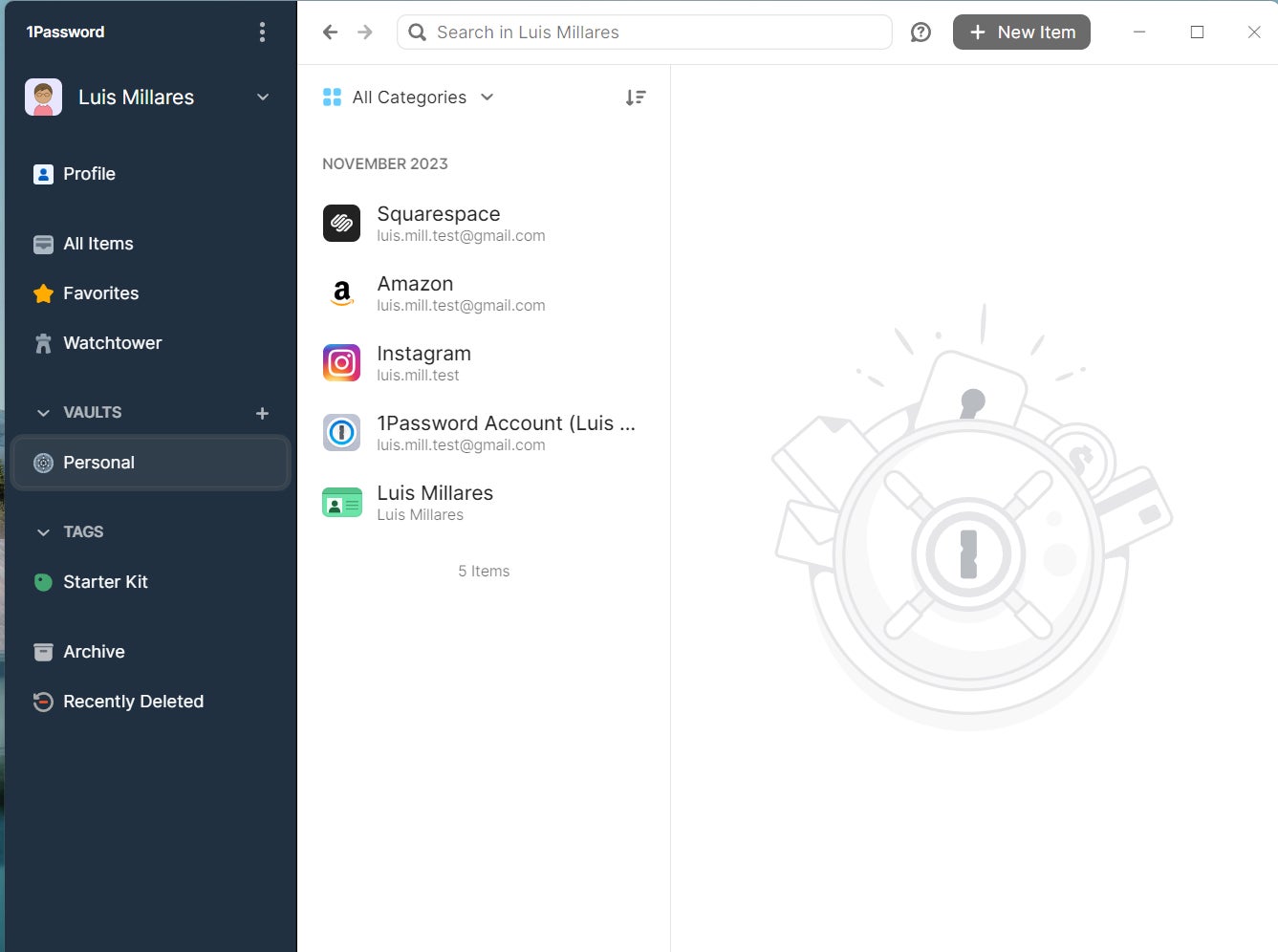
The whole user experience felt polished and well thought out. To me, this is critical for businesses that plan to integrate 1Password in their workforce, as it helps less tech-savvy users be comfortable with the software and maximize employee adoption.
On the other hand, Bitwarden implements a more minimalist interface with a simpler design. Subjectively speaking, I don’t have any major issues with Bitwarden’s UI. It’s decent and gets the job done.
However, it’s clear that Bitwarden has the more dated-looking application of the two. After testing both password managers, I personally prefer 1Password’s more user-friendly and refined application.
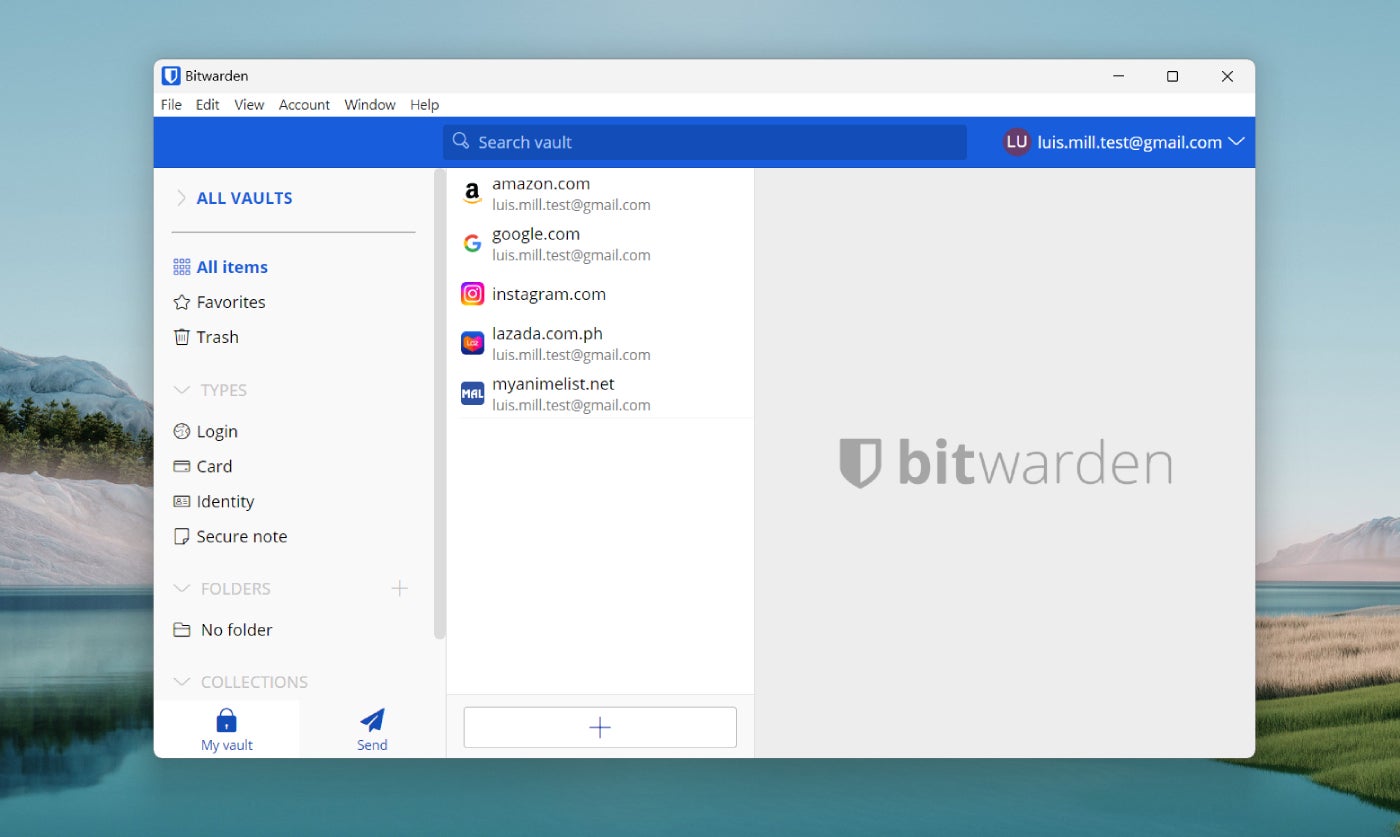
For performance, I found Bitwarden and 1Password were similar in offering a solid — but not perfect — password management experience. Both services had no trouble generating passwords or saving new log-in credentials.
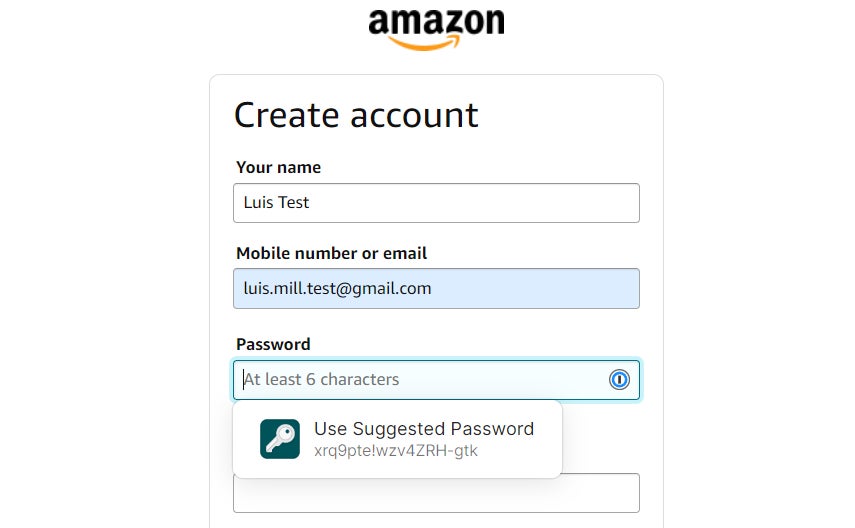
However, I did experience a few quirks with both services with their respective autofill capabilities.
For Bitwarden, I found it peculiar that autofill wasn’t toggled on by default. During my first time using Bitwarden, I had to manually click on the suggested password from the browser extension to insert my log-in details instead of Bitwarden automatically filling in. While this can be changed in the settings menu, I wish this had been turned on out of the box.
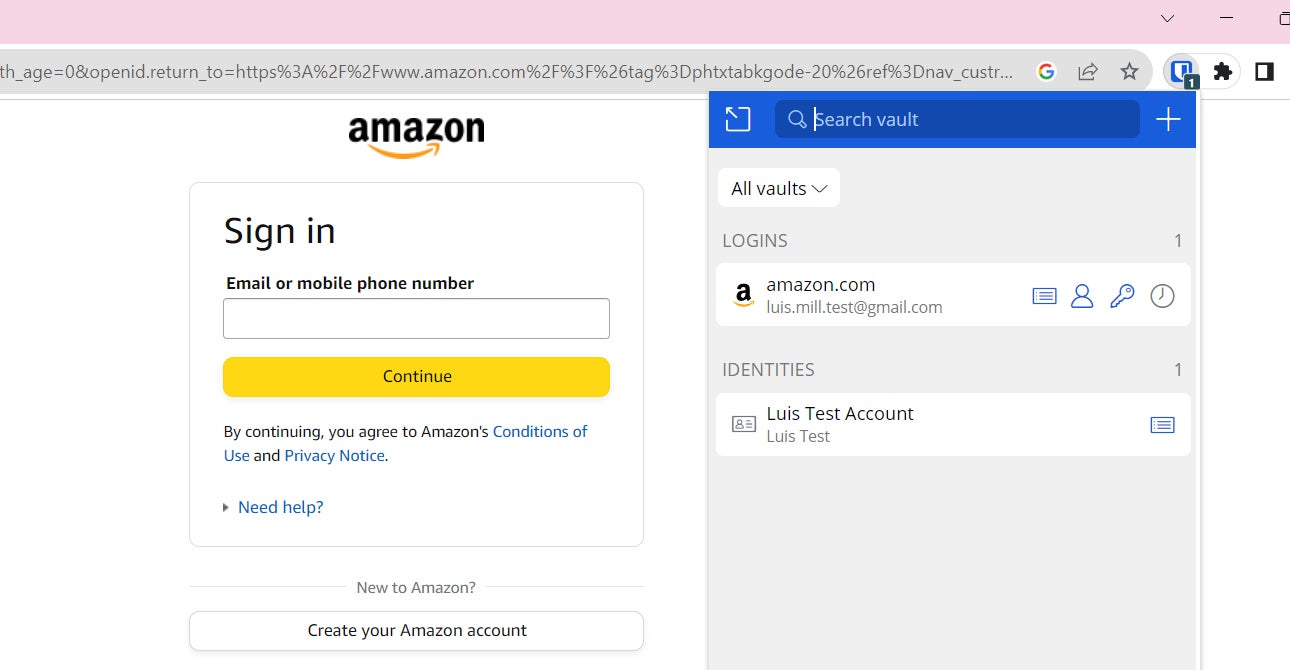
On the 1Password side, I had instances where it outright didn’t autofill my credentials, even when I ensured it was turned on.
Fortunately, these hiccups from both services were generally outliers. For the most part, both Bitwarden and 1Password provided a reliable password capture and replay experience. That being said, it must be mentioned that little quirks here and there are to be expected.
Extra features
Winner: 1Password
For extra features, I give the edge to 1Password. While both password managers offer reliable password storage and password generation, 1Password comes with unique functionality that helps it standout.
One unique 1Password feature I found noteworthy was its inclusion of Travel Mode. Travel Mode allows users to remove a vault of their choice when traveling.
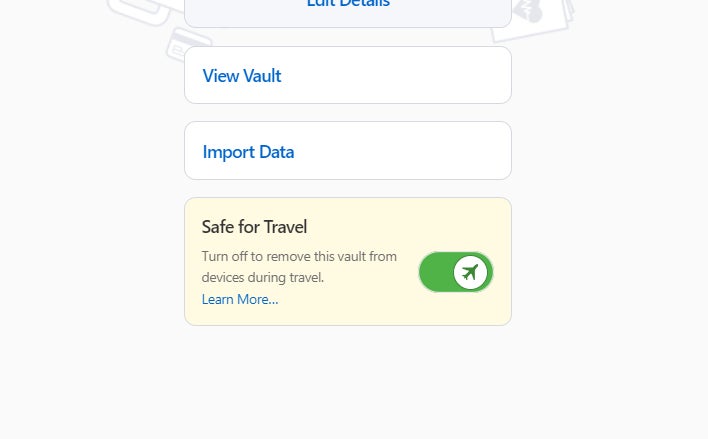
I envision this to be useful for users who frequently go on business trips and want to protect certain logins when going through customs or border agencies. 1Password also has a comprehensive Watchtower dashboard that automatically scores all your passwords in terms of password health and strength.
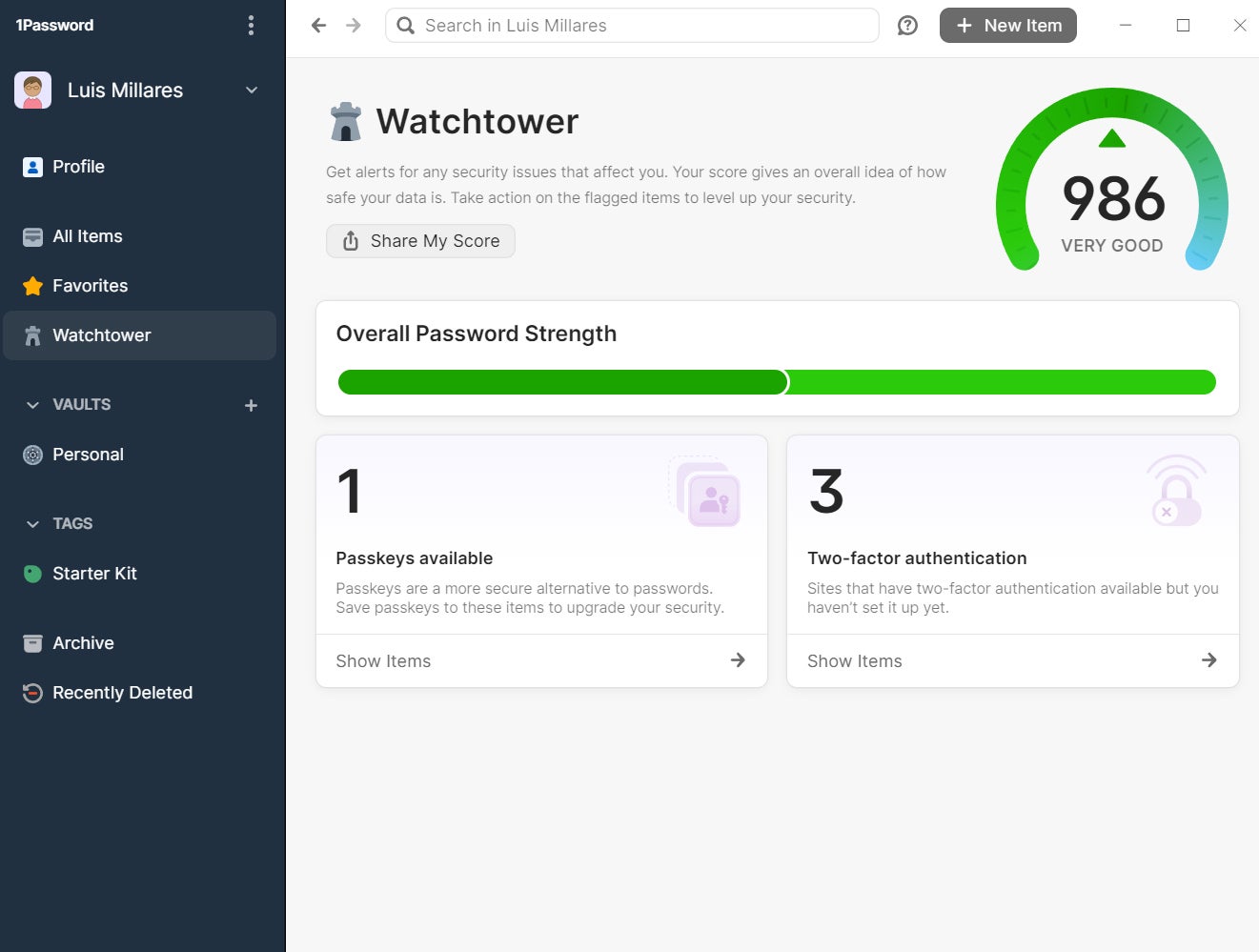
I particularly like how Watchtower also acts as a data breach monitor, alerting users if any of their credentials have been compromised or exposed in a breach. To Bitwarden’s credit, it also has a version of this called Vault Health Reports — which can create summaries of exposed passwords, data breach data, and the like.
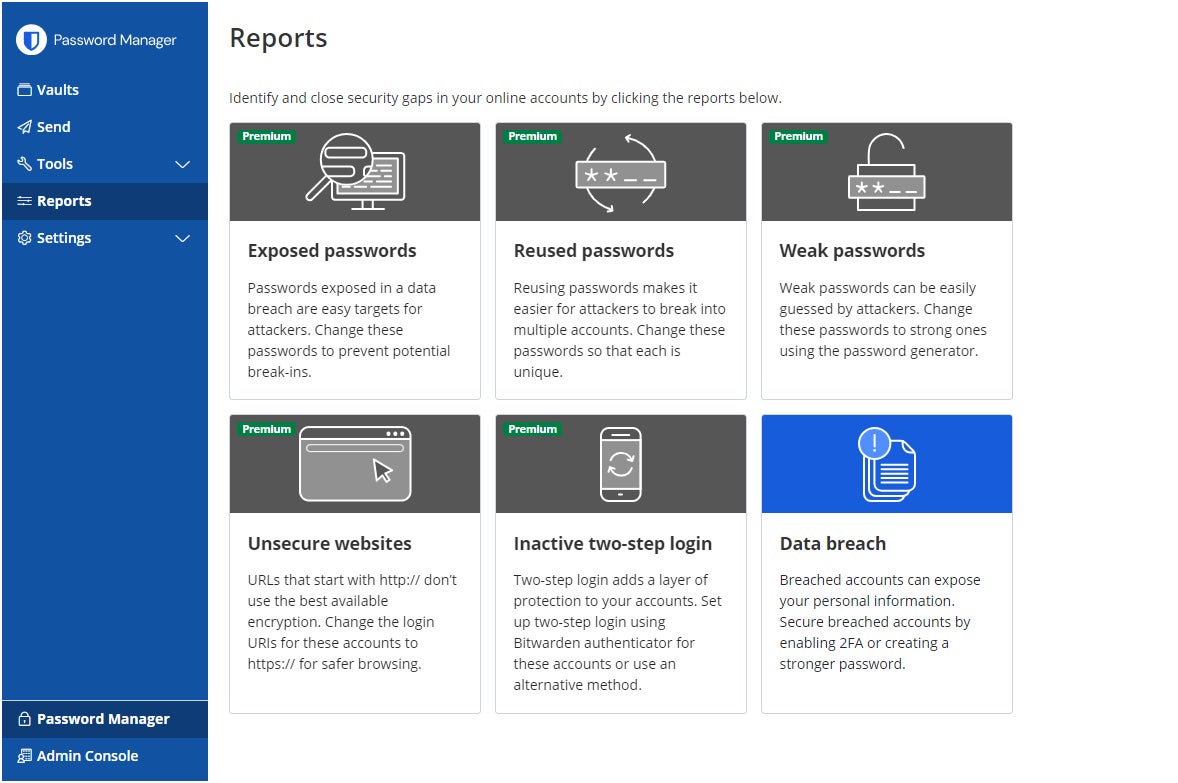
However, I found 1Password’s Watchtower to be more convenient since it creates all this data automatically. In comparison, Bitwarden users have to manually generate each Vault Report on their own.
One clear advantage Bitwarden has over 1Password is its dedicated free version. Where 1Password lacks a free plan, Bitwarden has one of the best free password managers, offering unlimited password storage for unlimited devices.
This is significant since other free password managers, like Dashlane or McAfee True Key, limit the maximum amount of passwords free users can store.
Bitwarden also has Bitwarden Send, its end-to-end encrypted text and file-sharing feature that can be used to share passwords, financial or legal documents, and other sensitive information.
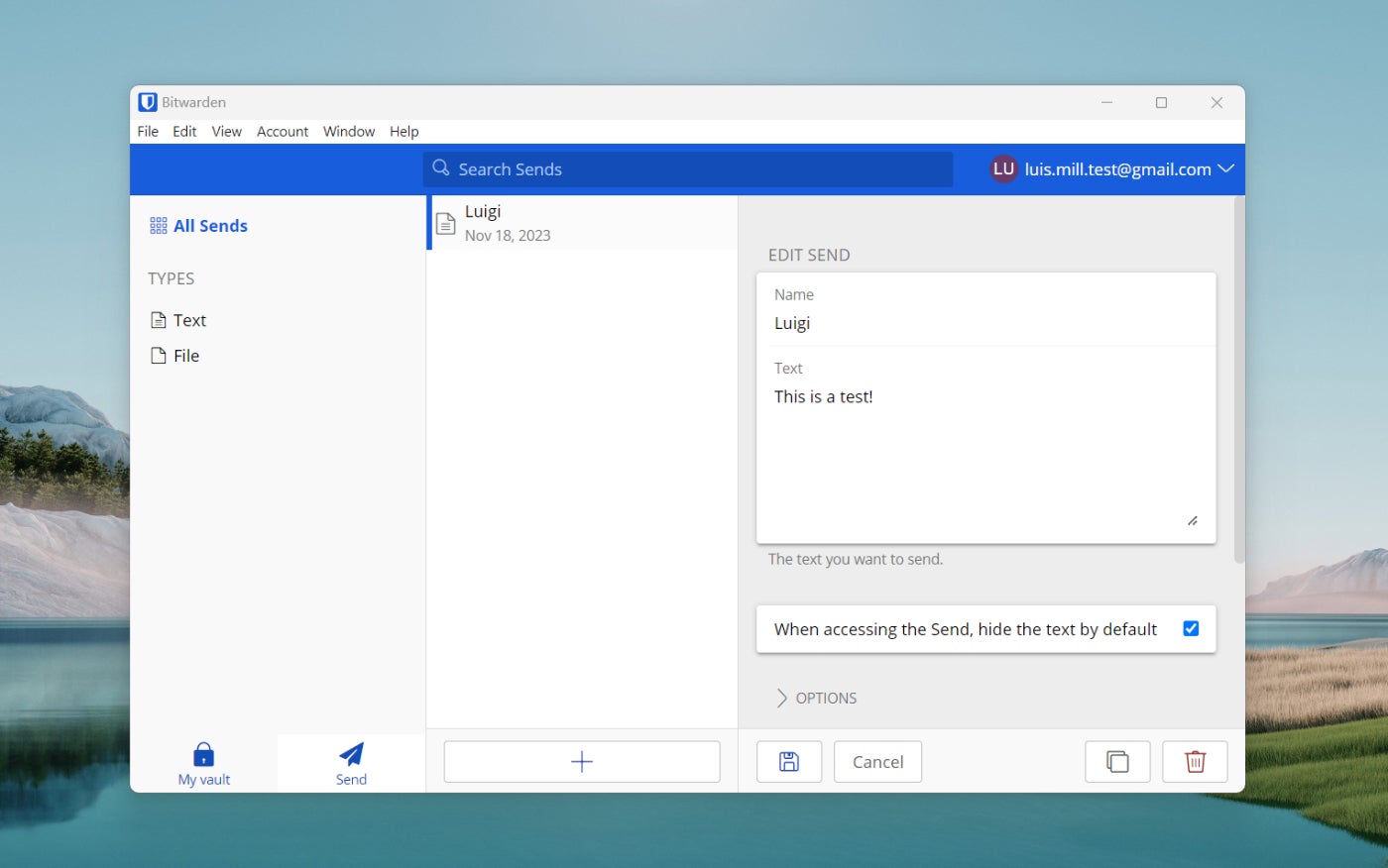
While both services provide their own standout features on top of password storage, I feel 1Password’s Watchtower and Travel Mode capabilities, among other features, provide significantly more value than Bitwarden’s feature set.
If you want more in-depth coverage of 1Password’s top features, check out TechRepublic’s Top 5 1Password Features video.
Customer support
Winner: 1Password
While both Bitwarden and 1Password have a healthy number of support options, I found that 1Password was slightly better in the customer service department. For Bitwarden, we get their dedicated Help Center featuring knowledge base articles and tutorials, an email and ticketing system, and its Bitwarden Community Forum.
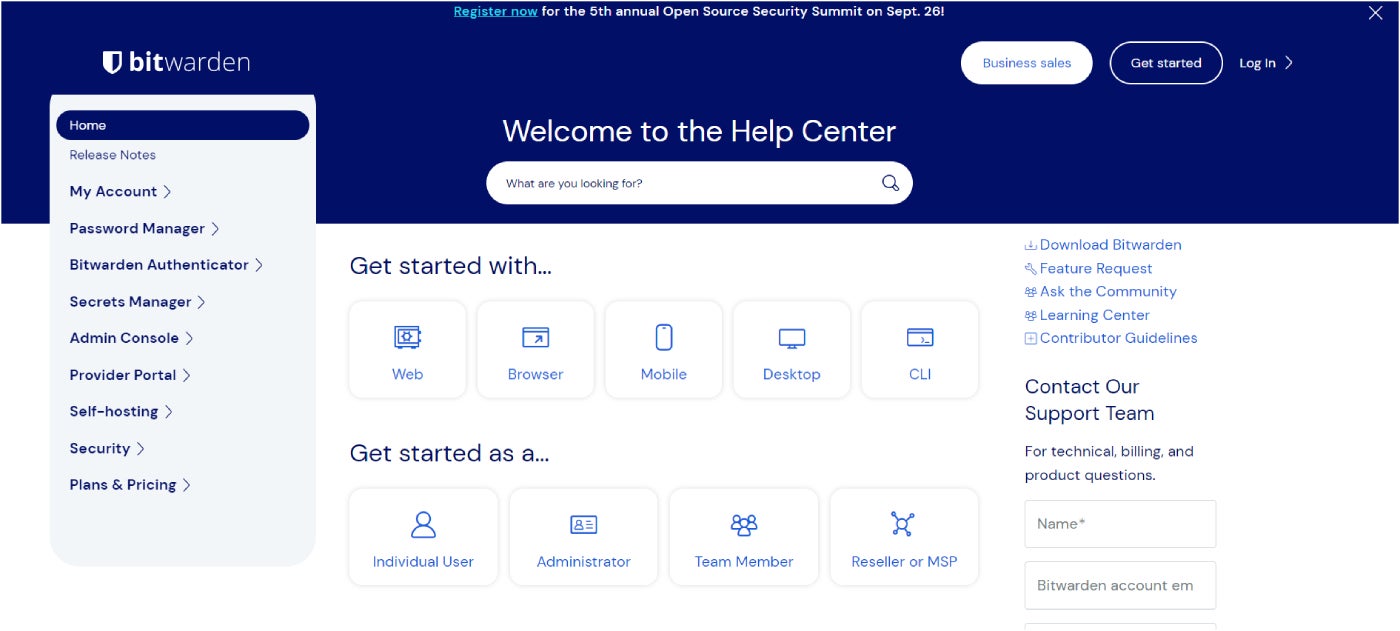
On the other hand, 1Password offers similar customer support with its 1Password Support page housing first-party guides, email and ticketing system, and its 1Password Community customer forum.
Unfortunately, neither password manager has live chat support to connect users with an actual support agent. However, 1Password offers an AI chatbot that acts as a fairly helpful substitute.
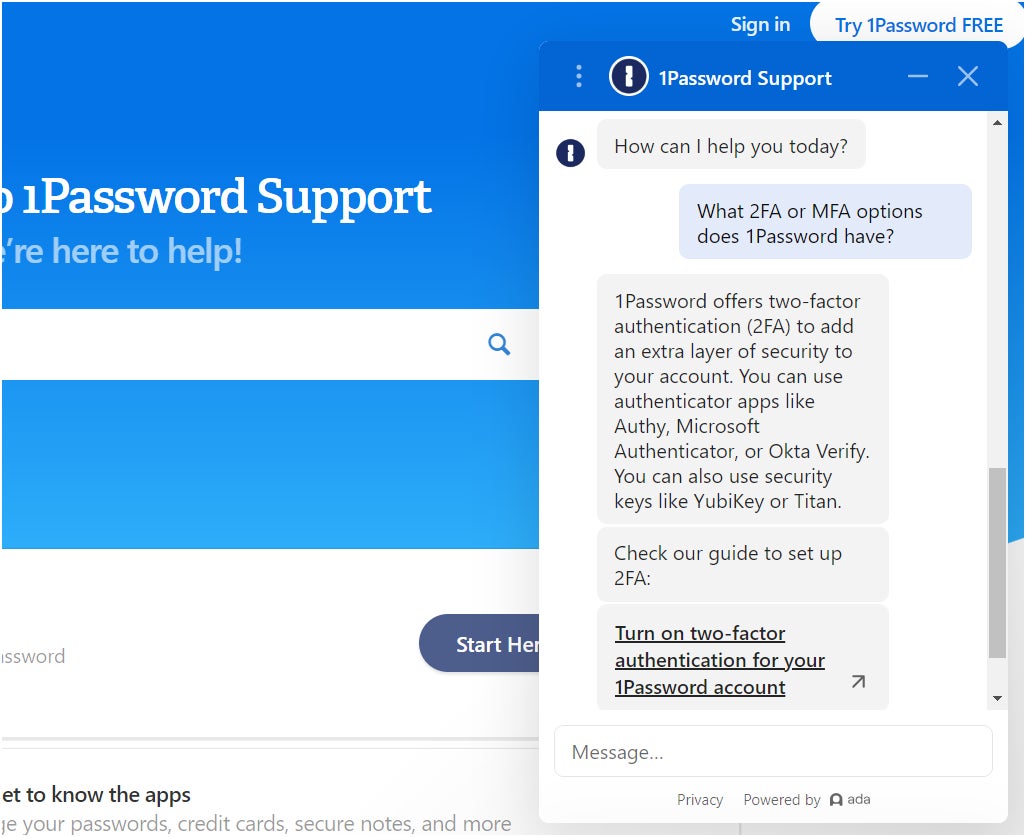
It was able to answer most of the questions I had with a reasonable amount of accuracy. Of course, a human support agent is more ideal, but I think having the chatbot to address quick questions is an underrated advantage. This can be especially useful if you’re pressed for time and don’t necessarily want to scour through support articles to answer a simple question.
I also appreciate how the chatbot itself is available for non-1Password users, not requiring an active 1Password subscription to access and use.
Value and price
Winner: Bitwarden
Bitwarden excels in its affordable pricing. At $0.83 per month, its base premium plan is almost three times more affordable than 1Password’s equivalent subscription at $3.99 per month. Its Families plan is also more cost-effective, priced at $3.33 per month for six users, compared to 1Password’s Families option at $4.99 for five family members.
That’s not to say that 1Password doesn’t have any value plans. 1Password’s Teams Starter pack at $19.95 per month covers up to 10 users, up to around $2 per user. This is a good deal, considering Bitwarden’s Teams plan will require around $40 for the same amount of users.
In terms of business plans, Bitwarden is once again more affordable with its $6 per month Enterprise plan compared to 1Password’s equivalent Business subscription at $9.99 per month, per user.
I also want to mention Bitwarden’s free version with unlimited password storage and unlimited device support — strengthening Bitwarden’s case as a prime pick for budget-oriented users. If affordability is a big priority, Bitwarden is the clear choice.
Bitwarden vs 1Password on Reddit
To round out this comparison, I looked to Reddit to get real user feedback from Bitwarden and 1Password users around the world. In general, both providers are frequently mentioned as top picks in forums talking about quality password managers. However, it’s clear that many users acknowledge the contrasting feature differences between the two services.
In the Privacy Guides Reddit community, one user said they preferred Bitwarden for its overall affordability and open-source nature. The commenter said, “I prefer Bitwarden a bit more than 1Password. Bitwarden is open source, and you can even host it yourself. I don’t remember if 1Password is open-source or not. Bitwarden is also a lot cheaper. It’s only $10/year to get premium that lets you see reports for things like breached passwords, weak passwords, reused passwords, etc., and adds different 2FA options.”
“And in terms of what they do, I feel like it’s not that different so $10 a year, to me, is better than about $35 a year for 1Password. Also, for some reason, I like the UI better in Bitwarden, which I think puts me in the minority,” the user added. This comment received 34 upvotes, reflecting most of the comments I saw praising Bitwarden as a cost-effective option.
Meanwhile, 1Password is highlighted for its modern and polished user interface. One commenter in the Ask Network Security Reddit community said, “As a consumer I love 1Password. Very easy to use on all platforms, has iPhone integration (can replace iCloud Keychain) plus Mobile Safari extension. Syncs basically instantly, no refreshing apps and waiting for a new change to propagate. Great UX.”
In the same subreddit, another commenter emphasized how 1Password was the best for due to its passkey support, smooth performance, and multiple layers of security.
Bitwarden pros and cons
Pros
- Open-source software.
- Affordable pricing across paid subscriptions.
- Free version with unlimited storage, and unlimited devices.
- Wide platform support and extensive MFA/2FA options.
- Independently audited.
Cons
- Less polished user interface.
1Password pros and cons
Pros
- Refined and intuitive user experience.
- Unique Travel Mode and Watchtower features.
- 24 third-party audits since May 2024.
- Offers AI chatbot for customer support.
- Value-laden Teams subscription.
Cons
Should your organization use Bitwarden or 1Password?
While this round-up saw a close fight between two quality password managers, 1Password comes out on top over Bitwarden. Per my testing, I found 1Password’s refined user experience, unique extra features, and slightly better customer support to have significant advantages over Bitwarden.
SEE: SMB Security Pack (TechRepublic Premium)
Even with its less affordable subscriptions, I think 1Password’s more user-friendly application is well worth the additional spend. This is especially true in the context of a business trying to integrate a password manager into their organization, as it reduces the learning curve for less tech-savvy individuals and employees.
Don’t get me wrong, I still think Bitwarden is a very good password manager in its own right. Its open-source nature will be appreciated by both privacy enthusiasts and developers. In addition, its generous free version and affordable paid plans are perfect for those on a tighter budget.
Choose Bitwarden if:
- You want an open-source password manager.
- You’re looking for a free password manager with unlimited password storage.
- You’re a budget-oriented user looking for an affordable yet high-quality password manager.
- You want a diverse set of MFA options.
Choose 1Password if:
- You want an all-around password manager with a well-designed and intuitive user experience.
- You prefer closed-source software.
- You want an affordable Teams plan that covers up to 10 members.
- You want a set-and-forget password health and data breach monitoring system.
- You’re a frequent traveler who needs a way to secure passwords while abroad.
Check out our full reviews of Bitwarden and 1Password for more details.
Review methodology
My match-up of Bitwarden and 1Password involved a comprehensive analysis of each password manager’s features, cost, and real-world performance.
Both password managers were scored on everything from their MFA options to their additional security features. In particular, we took into account five main pillars with their corresponding weights:
- Pricing (25%).
- Core password management features (35%).
- Ease of use (15%).
- Customer support (15%).
- Expert analysis (10%).
I also supplemented my findings with real-world user testimonials and other reputable review sites to round out my recommendations.
For more information on how we review password managers, you can view our full Review Methodology for Password Managers.



